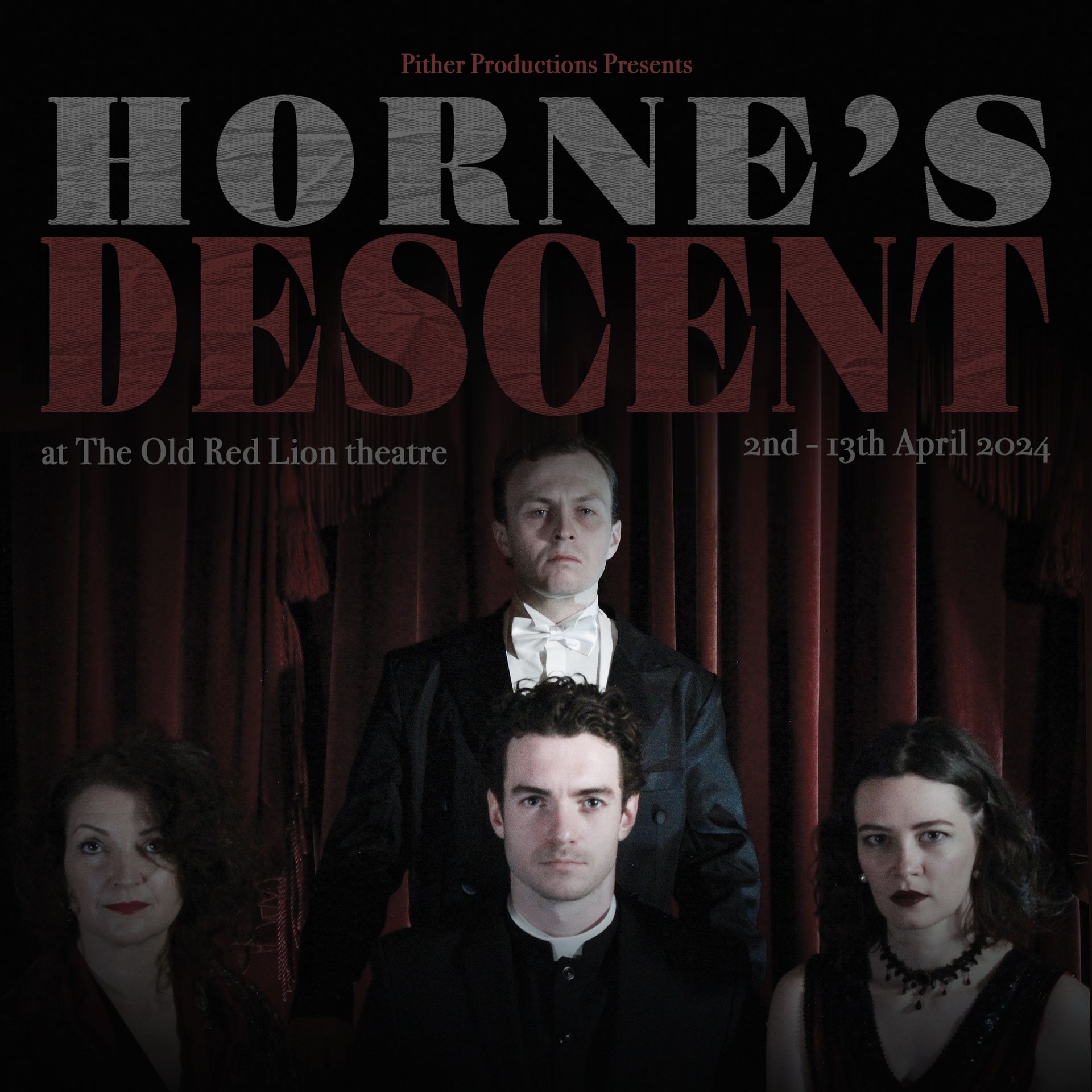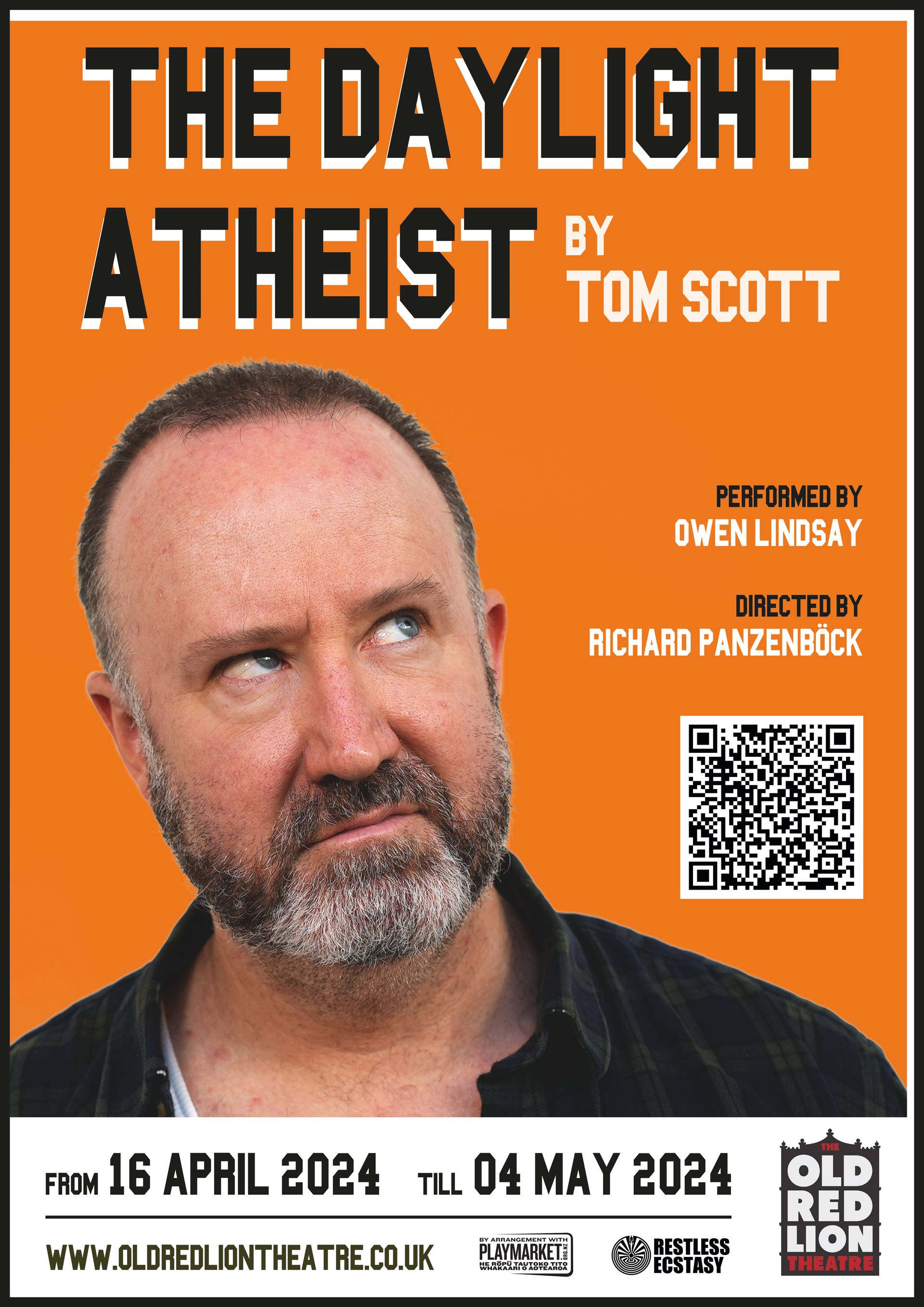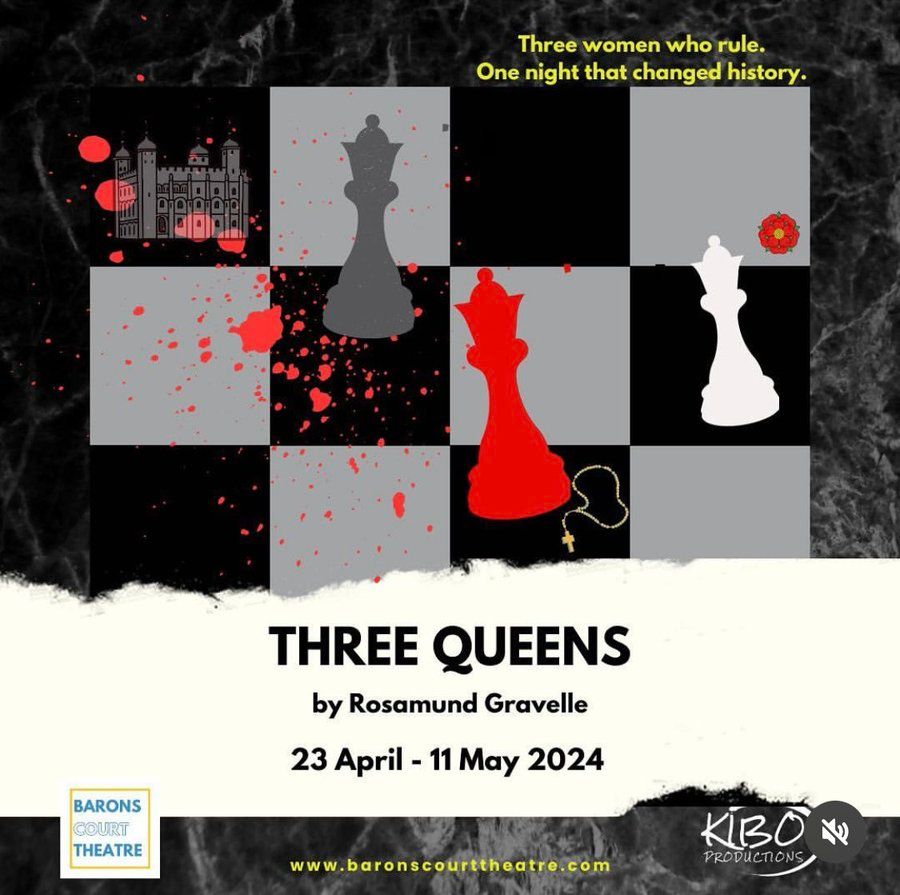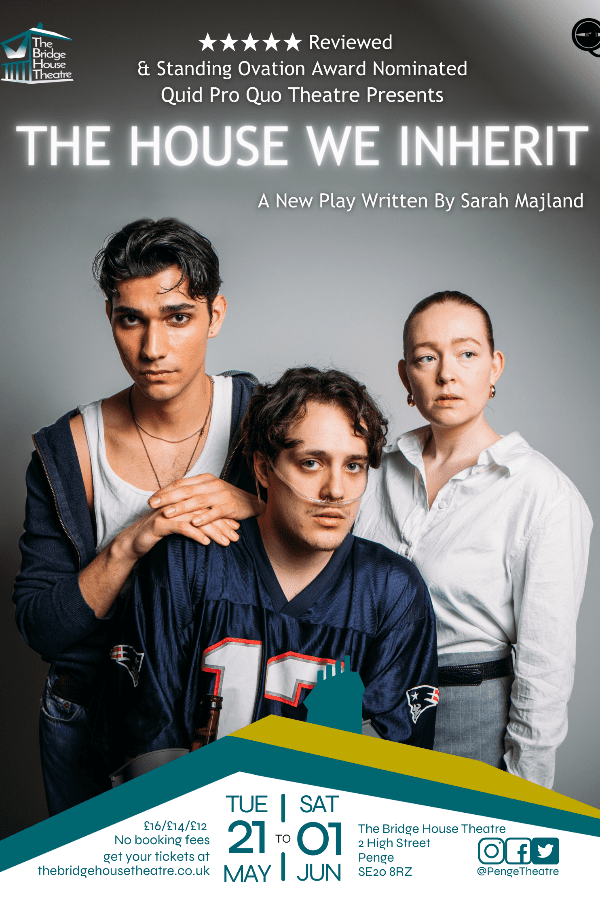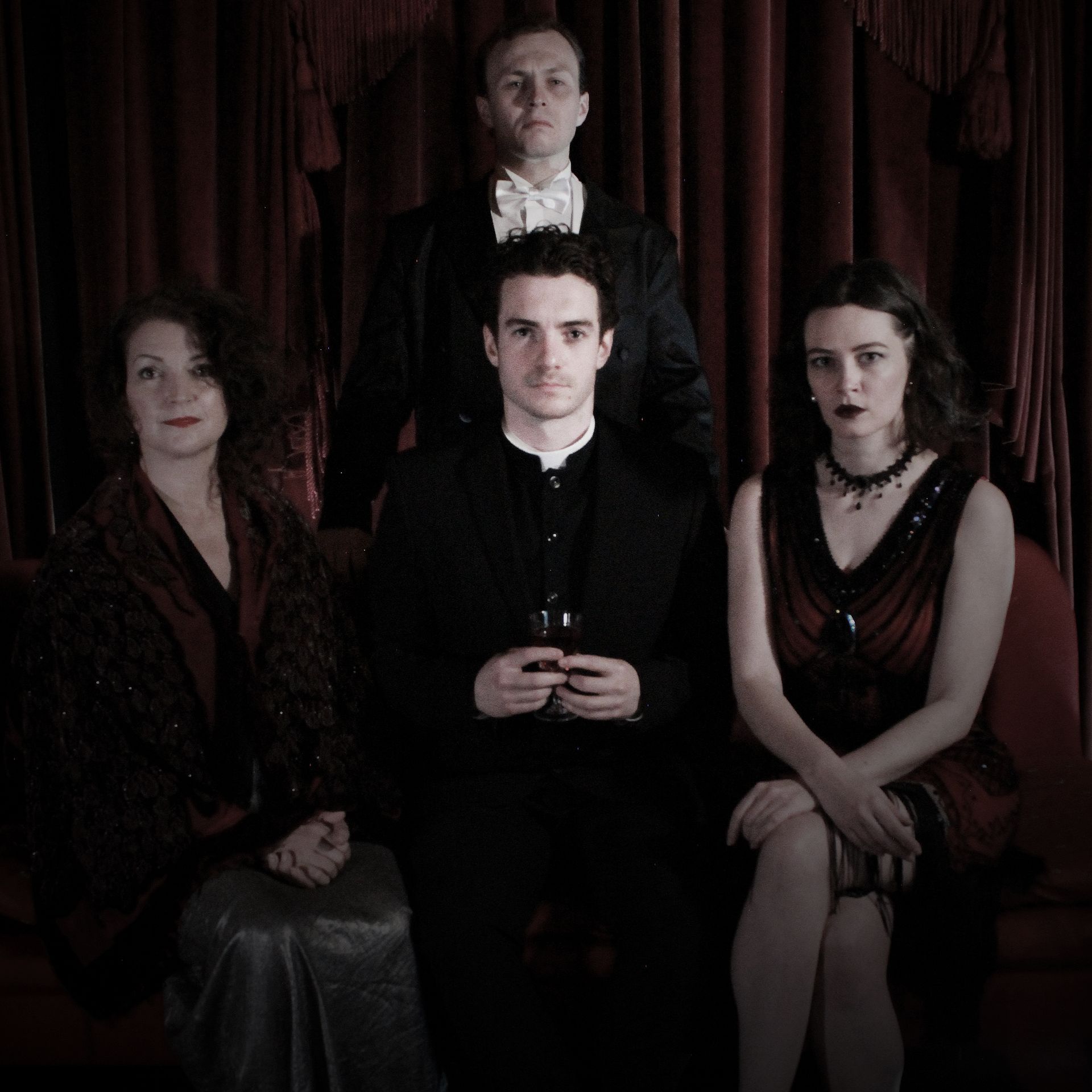
LPT: Wonderful to have this opportunity to chat about your upcoming show, Horne’s Descent. Nina, we know that ‘horror’ is your bag having won the London Horror playwriting competition with ‘The Drought’. Is this play treading on similar ground?
Nina : Always lovely to chat with you Heather! Thanks for having us. Yes, I’m starting to fall into a bit of a trend here aren’t I!? I think Horne’s Descent definitely has some similar themes that ‘The Drought’ explored; power dynamics in particular. With ‘The Drought’ it was between the Captain and his steward, in this one it’s between two childhood friends, a friendship which is primarily based on toxic control. Horror for me always lies in humanity itself; the horrors and traits we harbour as humans; jealousy, greed, anger… the things that really turn us into monsters, and those are emotions that are quite prevalent in this story.
Images: Top of page - Chloe Cattin (on left), Nina Atesh (on right). Above - Cast for Horne's Descent
LPT: We love the tag line which sounds really creepy and supernatural, is this an indication of the story in Horne’s Descent?
N: Hmm, it’s hard to say too much without giving it away! There is a supernatural element, but that’s more hidden and deeply embedded than just a generic ‘ghost story’ per se. This isn’t a ghost story at all, the ghosts are more present and physical; such as the haunting echoes of a very recent war (it’s set at the beginning of 1920) and that eternal battle within oneself to be Good or Evil. The story revolves around Peter Horne, a newly ordained priest, so religion plays a big part in the story, but also his struggle with his place in society, especially at a time when society was on this sort of precipice of radical change.
LPT: Why set the story just after WW1?
N: It was just an era which really fascinates me! England went through this huge shift, politically, socially, religiously. Everyone was kind of living this nice fairytale dream life of a picture-perfect England in the early Edwardian years, then suddenly this horrendous war came along, where so many people died, and there was such an injustice about it all, with so many working class men being thrown into the trenches. It’s a very fascinating subject matter psychologically, when you’re writing these characters who have lived through something like this; thinking about how it changes a person, how it changes their view of the world. Not only the men who went to war, but also the women who stayed behind, and had to experience it from afar, they were just as much a part of it too. But then after the war there was this big turning point, this big change in the class system and with women’s place in society. These were really big things which were fascinating to explore against the backdrop of the main theme of the show, which is ultimately religion.
LPT: Chloe, as director, how did you first encounter the play and what was your immediate impression?
Chloe: I worked with Nina on ‘The Drought’ as stage manager at the Kings Head and then went on to be the associate director for the run at the Old Red Lion adjusting the blocking from the traverse to (a sort of) end on configuration of the ORL. Nina and I both knew we wanted to work together - it was just about finding the right project! Nina spoke to me about two different ideas and after going with one, writing a draft and doing a reading of it, Nina realised the other idea interested her much more! It turns out, that idea was ‘Horne’s Descent’. So, I have been involved from the very beginning - right from the first utterings of the idea through the drafting process.
Although I am not particularly religious, I went to a religious school growing up, so I must admit, I felt a bit uncomfortable with the subject matter. It has developed a great deal since then. I never used to enjoy horror, but my boyfriend is a horror film maker. So, I begrudgingly watched films with him and learnt more and more about the genre. Once I realised that horror has the same mechanics as comedy, I could break everything down and stare the monsters in the eye. I now really enjoy them!
LPT: What really excited you about the play?
C: As a director, I like to make work that cuts through the fat and reaches the bone whether that’s through horror, comedy or everything in between. Nina writes about characters in extreme psychological situations, often pushing them to the brink of their limits. ‘Horne’s Descent’ is no different - the characters are grappling with big themes, in the aftermath of a world altering war which certainly makes for rich material to work with.
LPT: Are there any scenes that you think are going to be tricky to handle?
C: Although Nina is an atheist, not everyone on the project is. So due to the subject matter and the themes it brings up, I am handling the whole play and the people involved very gently. Wellness and safety is of the utmost importance for me as director so we have structures and people in place to make sure that people feel supported and safe.
LPT: The show is billed as a psychological interrogation into whether we have the power to change our lives. What do you both believe?
Nina: I have mixed feelings about this. I’m an atheist, so I don’t believe there is a God, or a Devil, or any kind of higher power that determines our fate. So, from that standpoint I should say yes, of course we do. However, I do think we are somewhat slaves to our own destiny, in that our lives are very much determined by the society we are born into (culturally and religiously). I do think we have freewill up to a point, and I do believe we have the power to make choices. We can make choices to be good, or bad, or kind, or unkind- and these things have a knock on effect. But so much of our chemical makeup determines this too; our psychological state, our surroundings, our parents, our friends. Are any of us really in control? I don’t know… these are some of the philosophical debates which may arise when people have watched the play, and they interest me a great deal, so perhaps that’s why I wrote it! I’m still trying to figure it out myself! The optimist in me wants to say we do have control, and we do have the power to change our lives. It just might be a bumpier ride for some.
Chloe: As a director, I manipulate a version of reality for audiences so to a certain extent, once audiences decide to come to the show, they are agreeing to their lives being changed in some way (however big or small). But as an individual, I do believe we have the power to change our lives. Societal structures, individual circumstances and a healthy dose of luck can help or hinder our lives, but we have the power to change them.
LPT: The play also touches on themes of classism and religion. What do you think about the class system in Britain today?
N: I think classism is still as rife in Britain today as much as it was in 1920. It’s different now; it’s not as obvious as it was back then; people aren’t in service anymore, the aristocracy don’t rule the land the way they used to; it’s much more subtle now and much more deeply embedded within us psychologically, almost like it’s a part of our DNA, but it’s definitely still there. It’s not recognised in the way racism is, or homophobia, because again, it’s not that obvious, and it’s not as vicious. But there is still a class system in Britain that exists in a different way, and people can be very quick to judge, very quick to vilify, and a lot of us probably do it without realising at all.
LPT: How about religion, is this a positive or negative in the play and could you tell us more about the role it plays in the drama?
N: I tried to be very careful about how I approached religion in the play; and of course it is the hot topic, what with the central character being a priest. But there is some occult-ist stuff going on here too, and this is the main thing Horne comes up against. He has a bit of a “my way is the only way”, attitude, but then you’ve got this rather outspoken woman who’s saying; well, what about this way? Not everyone reaches spirituality through the anglican church. So, I don’t think I put it in a positive or negative light, I tried to sort of come at it from a neutral angle, it’s rather more about how the characters react to it, and their place within the church, rather than my own.
LPT: Finally, should audiences come with a pillow to hide behind, tissues for tears or will we be chortling our way through the piece?
N: Hah! No, I don’t think this will cause anyone to hide behind any pillows, my writing tends to be the sort of ‘scary’ that will probably affect people on a deeper level than just a short jumpscare. I’m fully against jumpscares! I don’t think there will be any tears either, but there may be a few chortles to be had, and maybe even a couple of gasps. I hope so!
HORNE'S DESCENT
at Old Red Lion Theatre 2 - 13 April
Cast: Alexander Hackett, Bethany Slater, Cici Clarke and Magnus Gordon
